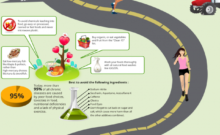Plastics are packed full of a variety of chemicals. Many of these chemicals have never been tested for long-term use with humans. While there are many reasons to avoid plastic for food storage, here are the five biggest problems with its use. 1: Phthalates One of the most publicized problems with using plastic for storing food is the chemical known as phthalates. Phthalates are used to soften plastics to make them more pliable and usable. While making plastic more convenient to manufacture, these chemicals leach into food products stored in plastic containers. Research has shown that most people in the United States have a high level of phthalates found in their systems which is extremely troubling, especially when these chemicals are found in children. Some of the effects associated with this chemical include higher rates of breast cancer, endocrine function disruption, birth defects, liver damage, low birth rates and more. 2: Bisphenal A (BPA) Another chemical that is commonly found in plastics is Bisphenal A which is also known as BPA. Although some plastic containers are now labeled as BPA free, many more still contain this chemical. The CDC has found BPA to be present in 93% of children tested and 95% of adults tested. This chemical can also leach into foods quite easily and can cause miscarriage, polycystic ovarian syndrome, infertility, ovarian cysts, obesity, baldness in women, prostate gland cancer, reproductive organ defects, early puberty and breast cancer. 3: Liquid Foods in Plastic There is a particular problem when liquids that are going to be consumed by people are stored in plastic containers. Liquids tend to absorb the leached chemicals found in plastic more easily than dry goods. This effect is even more profound when it comes to hot liquids contained in plastic. Coffee, tea and hot chocolate are a few examples of liquids that should never be put into plastic. The heat works to break down the plastic to cause it to leach chemicals and the liquid readily absorbs it. Liquids that have been exposed to the sunlight and cooled again should also be avoided. Do not drink from a plastic bottle that has been left in a vehicle. 4: Cooking with Plastic Warming up plastic in any way – whether through putting it in the dishwasher, leaving it in the sun or cooking in the microwave – causes the plastic to speed up its chemical leaching process. Any amount of heat breaks down the plastic which makes warming up foods in the microwave in plastic a very bad idea. Plastic storage containers that are used to freeze foods and then defrost them in the microwave can cause more chemicals to be present in the foods that are being consumed. 5: Environmental Concerns If the health issues outlined above are not enough to make consumers stop using plastics for food storage, the environmental damage caused by plastic may make them think twice. Plastics will not break down in any measureable amount of time. It a plastic container is thrown away today, it will still be there 500 years from now. Each small piece of plastic adds up to overfilling landfills full of plastic that is very slowly breaking down and leaching chemicals into groundwater and the very earth itself. Foods of any kind should never be stored in plastic. Avoid plastic in the kitchen by using alternatives such as glass, cardboard, ceramics and wood instead. Even plastic wraps and the linings of cans can be a huge problem to the health of people and of the planet. Above image source: Flickr/Dan4th
5 Reasons to Never Store your Food in Plastic
Tags:
Leave a Reply




